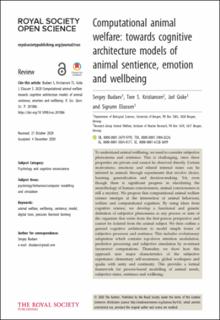| dc.contributor.author | Budaev, Sergei | |
| dc.contributor.author | Kristiansen, Tore S | |
| dc.contributor.author | Giske, Jarl | |
| dc.contributor.author | Eliassen, Sigrunn | |
| dc.date.accessioned | 2021-04-29T10:50:49Z | |
| dc.date.available | 2021-04-29T10:50:49Z | |
| dc.date.created | 2020-12-26T08:20:43Z | |
| dc.date.issued | 2020 | |
| dc.Published | Royal Society Open Science. 2020, 7 (12), . | |
| dc.identifier.issn | 2054-5703 | |
| dc.identifier.uri | https://hdl.handle.net/11250/2740346 | |
| dc.description.abstract | To understand animal wellbeing, we need to consider subjective phenomena and sentience. This is challenging, since these properties are private and cannot be observed directly. Certain motivations, emotions and related internal states can be inferred in animals through experiments that involve choice, learning, generalization and decision-making. Yet, even though there is significant progress in elucidating the neurobiology of human consciousness, animal consciousness is still a mystery. We propose that computational animal welfare science emerges at the intersection of animal behaviour, welfare and computational cognition. By using ideas from cognitive science, we develop a functional and generic definition of subjective phenomena as any process or state of the organism that exists from the first-person perspective and cannot be isolated from the animal subject. We then outline a general cognitive architecture to model simple forms of subjective processes and sentience. This includes evolutionary adaptation which contains top-down attention modulation, predictive processing and subjective simulation by re-entrant (recursive) computations. Thereafter, we show how this approach uses major characteristics of the subjective experience: elementary self-awareness, global workspace and qualia with unity and continuity. This provides a formal framework for process-based modelling of animal needs, subjective states, sentience and wellbeing. | en_US |
| dc.language.iso | eng | en_US |
| dc.publisher | The Royal Society | en_US |
| dc.rights | Navngivelse 4.0 Internasjonal | * |
| dc.rights.uri | http://creativecommons.org/licenses/by/4.0/deed.no | * |
| dc.title | Computational animal welfare: towards cognitive architecture models of animal sentience, emotion and wellbeing | en_US |
| dc.type | Journal article | en_US |
| dc.type | Peer reviewed | en_US |
| dc.description.version | publishedVersion | en_US |
| dc.rights.holder | Copyright 2020 The Authors | en_US |
| dc.source.articlenumber | 201886 | en_US |
| cristin.ispublished | true | |
| cristin.fulltext | original | |
| cristin.qualitycode | 1 | |
| dc.identifier.doi | 10.1098/rsos.201886 | |
| dc.identifier.cristin | 1863247 | |
| dc.source.journal | Royal Society Open Science | en_US |
| dc.source.40 | 7 | |
| dc.source.14 | 12 | |
| dc.relation.project | Norges forskningsråd: 239834 | en_US |
| dc.identifier.citation | Royal Society Open Science. 2020, 7 (12), 201886. | en_US |
| dc.source.volume | 7 | en_US |
| dc.source.issue | 12 | en_US |

